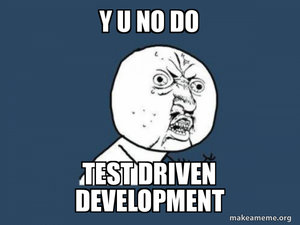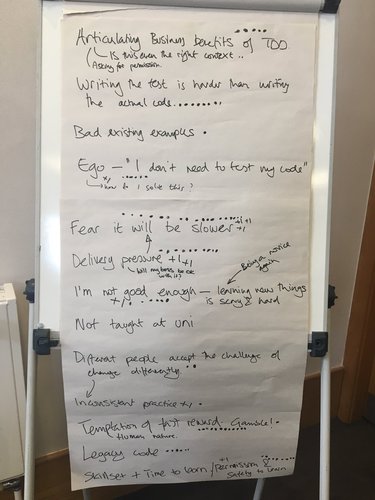 During this year's GeeCON the crew organised an Open Space evening. (An Open Space is a self-organising meeting where the agenda is created by the people attending.) I participated and ran a session on the question why we are not doing Test Driven Development. (Y U No Do TDD?) I am running TDD trainings from time to time and wanted to get more insight where people are stuck with TDD.
During this year's GeeCON the crew organised an Open Space evening. (An Open Space is a self-organising meeting where the agenda is created by the people attending.) I participated and ran a session on the question why we are not doing Test Driven Development. (Y U No Do TDD?) I am running TDD trainings from time to time and wanted to get more insight where people are stuck with TDD.Context
As I said, an Open Space is self organising, and only people interested in TDD attended my session. This is a typical problem of communities of practice - only people interested in the topic attend - which results in us living in a bubble. For example long time TDD practitioner Thomas Sundberg and Shirish Padalkar, lead consultant at ThoughtWorks, participated in the discussion. Depending on the background of each individual participant, my original question was understood as:
- Why are you not doing TDD on production work at all?
- Why are you not doing TDD most of the time?
- Why are you not doing TDD all the time?
Prototyping
I am "experimenting with something", the "expected outcome is unclear" and "it's only a prototype". Obviously these are valid reasons as Spikes are outside of TDD. These answers usually coming up quickly makes me wonder if they are kind of excuses sometimes. Experimenting with new libraries and APIs is covered further down, so what are we experimenting with? I worked with many developers who would agree that the expected outcome of their current ticket was unclear - because they did not take the time to analyse the story and understand the solution they were supposed to build? Additionally most of our prototypes go to production after all, don't they ;-)
Time Pressure
Another reason - given by some of my clients too - is their need to go fast: "I need to go very fast", there is "no time for that" and I "believe to be faster without it". While they might be wrong in the long term I understand the effects of pressure. One person made it more explicit, while he has no strong deadline, he said "I have a huge backlog, I am stressed". Indeed when I am extremely stressed, I find it hard to maintain a structured approach, especially if a lot of task switching is involved. Besides the needed skill to apply TDD under high load, much discipline is required to endure pressure. In such situations Strong Opinions and Dogma might help.
Missing the Bigger Picture
I am just "writing a script for myself". Maybe there is no need for automated tests when writing a one time script for myself. TDD has a testing aspect - and it has many other aspects like designing software, fast feedback and working incrementally. TDD is not only about testing. Some people miss that or have only partial understanding of the benefits or do not care for these benefits at the moment. The opposite reason is "because I know how the class will look like". Yes TDD is about software design as I said before, and I would like my class to work, too. Some people only want the fast feedback, e.g. using REPL based development and "looking at UI is faster".
Missing Priority on Testing
When starting with TDD, the testing aspect is most visible. After all we have to write a reasonable test first. For teams and organisations with low or missing priority on testing, people are "looking down on testing" and I got answers like "testing is a culture thing", "testing is not a first class activity" and "I am not asked to create a test by my project manager". Indeed it is hard to keep following TDD if it is looked down upon and if there is no time for quality work.
Avoiding Context Switches
There is a certain amount of context switching involved in TDD. Similar to Edward de Bono's Six Thinking Hats, we have different states which we have to be mindful of and which call for different actions. George Dinwiddie created a TDD Hat to show that. Maybe this switching is "not natural for some people". "I don't want to interrupt creative design with verification" and "I prefer staying in building hat and not change to testing hat". Similar one participant said that it is "easy to write code, harder to write tests, so I do it afterwards". I understand and there is certainly an urge to jump into the code and get hacking. I rarely feel that urge and I enjoy pair programming using the Ping Pong style because it enforces the separation of states without any (inner) discussion.
Missing TDD Skills
This is obviously the largest area and there is nothing wrong with not knowing how to apply Test Driven Development: Honest people just say "I can't do it". Many are aware of this problem and seem to be disappointed with existing material and/or look for more material to study TDD: "It is not taught at universities", "there are no good books" and "I am missing real examples". I know from my own experience that TDD is not easy to learn and some people are "scared for life after a bad experience" with it. Now the best way to learn TDD is to have someone show you while pairing with you. Even if there is no pair programming in your workplace, you can still experience it during a Coding Dojo or Coderetreat. Short of that, I recommend Kent's Beck Test Driven Development by Example, which is a short and excellent introduction.
New Language or Library
When discussing TDD and unit testing with a client, he said I "don't know the target technology" and "React is a new technology for us". I had to laugh. To me this sounded like "I got a car and know how to drive forward, but am not able to drive backwards." On the other hand I live at the dead end of a road and I see drivers working really hard to avoid driving backwards. Are they not able to do it? So maybe stopping halfway in the game (of skill acquisition) is natural after all. When working with some new language or working with an unknown API, I specially rely on tests to support me, these are Learning Tests.
It's too hard to test
I agree some things are harder to test than others. "Android is hard to test", "Vaadin is hard to test" and "some libraries are hard to test". (I have not worked with Android or Vaadin, I quote people.) We might need to know more about design to decouple things. This is definitely true for legacy code, as "existing code is usually hard to test". Some people see the root cause, like in "I don't know how to manage boundaries". In such situations we need (to know) more tooling. We definitely "need more tooling to test the UI" as UI is traditionally considered hard to test from a TDD perspective. Still, Steve Freeman and Nat Pryce, authors of Growing Object-Oriented Software Guided by Tests, always start their TDD (outer) loop with an UI test. GOOS is a great book and I recommend reading it if you want to go deeper into TDD.
It's too simple to test
If there are things which are too hard to test, there must also be things which are too simple to test, right? It is "useless to test, it is so simple" and it "makes no sense to test it". Maybe a better description is that it is "unclear what is important to test". From a TDD perspective no such things exist and I guess these reasons arise from the test after process, when looking at each public method and thinking how to test it. Further excessive test isolation, see Solitary vs. Sociable Unit Tests, will cause that.
Barriers to TDD adoption
Here is Matt Wynne's summary of Barriers to TDD adoption from a session during Lean Agile Scotland 2016. I recommend checking out the Twitter thread as Matt added detail discussions on temptation of fast reward, permission and safety to learn, "the egotist" and other reasons not covered by me.

What about test-induced design damage?
Maybe the only real reason not to do TDD is to keep the design integrity of your system. This idea was started back in 2014 by David Heinemeier Hansson, also known as DHH, and led to the whole Is TDD Dead? debate. DHH said that when using TDD code sometimes suffers tremendous design damage to achieve two testing goals: Faster tests and easy-to-mock unit tested controllers and that the design integrity of the system is far more important than being able to test it any particular layer. It is ironic that this never comes up during any group discussion or team interview. Probably because it is an expert level reason. If you followed the debate, DHH knew TDD, he used it for some time and liked it. And then, only then, did he know when not to apply it.








3 comments:
I'm curious if you say that basic getters and setters are still not too simple to test. I've usually heard those aren't worth it. If you still think they should be, what is your opinion on testing basic, "codeless" properties, like in C# or Kotlin?
Thank you for your question.
From the unit testing perspective I consider getters/setters too simple to test, usually they are covered by other tests which use them.
From a TDD (test first) perspective imho this question does not come up. I never started my red-green-refactor cycle with a test for a getter/setter. Such a test is no scenario and does not reflect any (part of) requirement.
Okay. Glad to hear it. I just wanted to make sure you didn't include them in your "too simple to test" section. Other than DTOs, I try to avoid getters and setters anyway, but there are always some instances where it's just simplest to use them.
Post a Comment